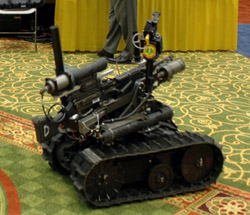TheObserver: An orange sun set over the city, casting just enough light to finish the kickabout, when the players heard the unmistakable sound of rockets whooshing overhead.
Seconds later the missiles slammed into Abu Ghraib, the jail adjoining their football pitch. Explosions resounded across the complex and more rockets were launched. The Americans fired back.
The 25 children and seven adults sprinted to a wall enclosing the school grounds and huddled together, waiting for the storm to pass. But the attack intensified and bullets peppered closer so the group scrambled into a communal toilet. They cowered in darkness as hits on their shelter showered dust and masonry fragments. Some of the children started to sob, vomit and soil themselves.
'We put our hands in the children's mouths to stop them crying. It was the most difficult time of my life' said Abu Mohammad, 38.
For 12 hours the group crouched in the three-square-metres space, murmuring prayers as car bombs detonated outside, until dawn broke and they emerged, waving a white T-shirt, to a scene of devastation.
Last Saturday's attack on Abu Ghraib drew worldwide headlines as one of the boldest insurgent operations in Iraq, which wounded 44 US troops and underlined the vulnerabilities of the occupation two years after the invasion.
Thousands of Shias loyal to the militant cleric Moqtada al-Sadr gathered in Baghdad yesterday, the anniversary of the city's fall and the toppling of Saddam Hussein's statue, to demand an American withdrawal. It is a wish even closer to the heart of Arab Sunnis, who form the insurgency's backbone. The attack on Abu Ghraib, a symbolic target since last year's inmate abuse scandal, underlined a shift from hit-and-run ambushes to large-scale assaults.
To tackle the sprawling complex 20 miles west of the capital, which doubles as a US base, they used almost every type of weapon in their armoury. An internet statement purportedly from the militant Abu Musab al-Zarqawi claimed it was the work of his group, al-Qaeda in Iraq, and depicted a heroic, slick engagement which lasted several hours and deployed seven suicide car bombers. 'Then the merciful brigades and Muslim soldiers clashed with the infidels.'
This version, according to senior coalition commanders, was aimed at sympathisers in the Gulf who funded the insurgency and expected to see results before stumping up again.
The Americans painted a less dramatic picture, saying mortar rounds and rockets were followed by attacks by gunmen on foot. At one point, defenders destroyed a suicide car bomb before it reached the walls and rapid-response troops backed by Apache helicopters and artillery repulsed the rest of the attack after 40 minutes.
While conceding its sophistication, a US spokesman said the assault did not breach the walls, free inmates or kill coalition forces and was therefore a failure, costing the insurgents dozens dead and wounded.
Only now have those caught in the crossfire given their version. It partly contradicts the US and al-Zarqawi statements by claiming there was chaos and panic on both sides and, in the aftermath, looting by US and Iraqi security forces.
Mohammad, one of the adults who sheltered in the toilet with the children, including his three-year-old son, lives in Khan Dhari, a district near the jail inhabited by working-class Arab Sunnis hostile to the occupation.
As they do most Saturdays they met in the grounds of a primary school on the south-western side of the jail to play football. Guards in watchtowers would have seen that the group was mostly young children, said Mohammad.
When rockets landed around them, guards returned fire wildly, apparently unconcerned about civilian casualties. Even when searchlights 'turned the place into day', US bullets continued hitting the school despite the absence of rebels there, he said.
At some point the jail gates opened and Humvees roared out - probably the rapid-response forces - only for a black Opel packed with explosives to slip into the convoy and blow up. 'It was a hell of fire,' said Mohammad, a tall, wiry Islamic scholar, who said he saw charred Humvee engines and a human hand and leg.
From the toilet his view was restricted, but the next day relatives and neighbours filled in details. Two suicide bombers in South Korean-made KIA vehicles rammed tanks. Another bomber driving a pick-up truck got lost and knocked on doors asking directions to the nearest US target. 'He was a foreigner and asked why people were not coming out for jihad.'
By 5.45am the football players, thirsty, exhausted and terrified, heard the wail of a mosque's muezzin summoning people to prayer. They ventured out to be met by Iraqi soldiers who were astonished no one was hurt given the damage to their shelter. Suspicious, the soldiers demanded to see the football as proof of their story. It was found in a corner of the pitch.
Mohammad, who made no secret of his sympathy for the rebels, claimed that in the clampdown that followed Iraqi troops broke into dozens of shops and looted fruit, biscuits, soft drinks and electronic goods.
US troops joined in, he said, with one soldier wresting a bag of mobile phones from an Iraqi and several others catching a goat and a sheep which were driven in a Humvee back to their base. There was no way of verifying the allegation.
Two months after the election Iraq's parliament named a President and Prime Minister last week, paving the way for a new government which is expected to accelerate the handover of security from coalition to Iraqi forces and empower the majority Shia community.
But tens of thousands of militant Shias who gathered in Baghdad yesterday demanded an immediate pullout, or at least a timetable. 'No, no, to the occupiers,' they chanted, waving effigies of George Bush and Tony Blair.













